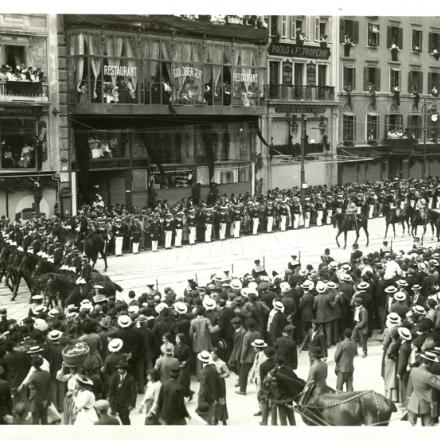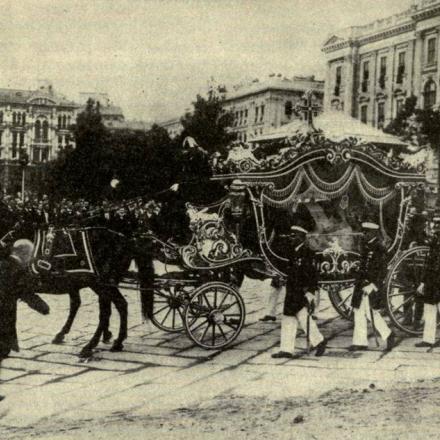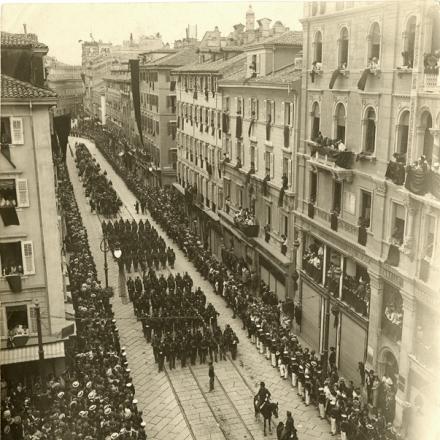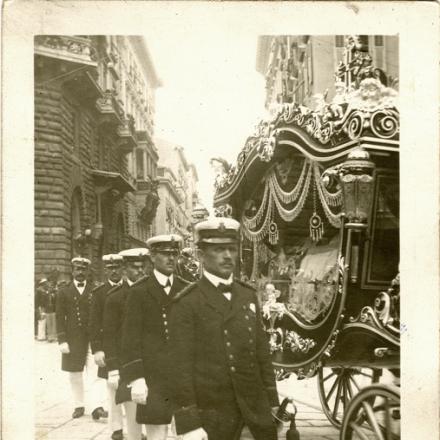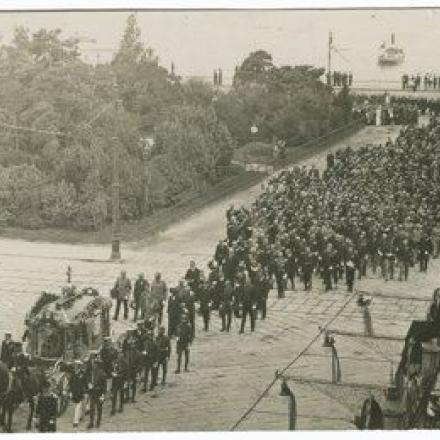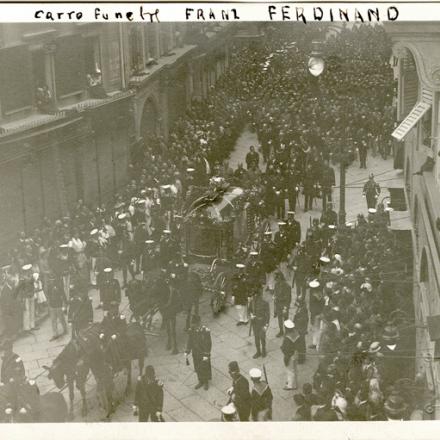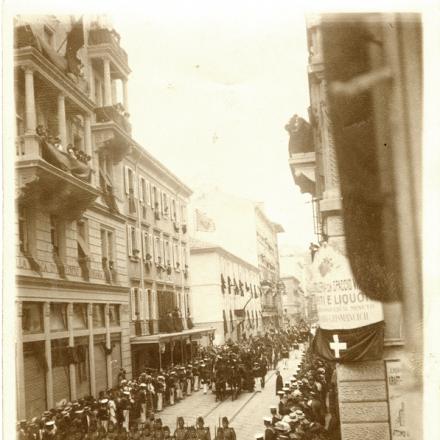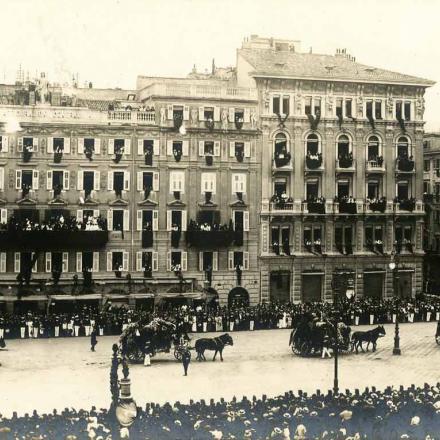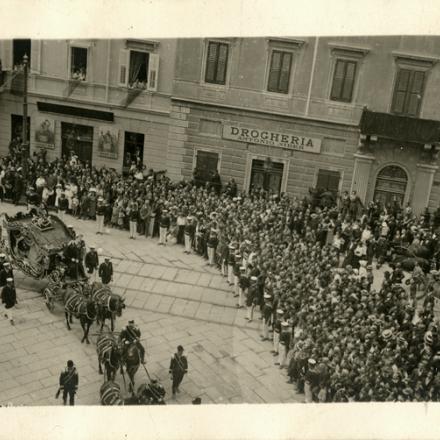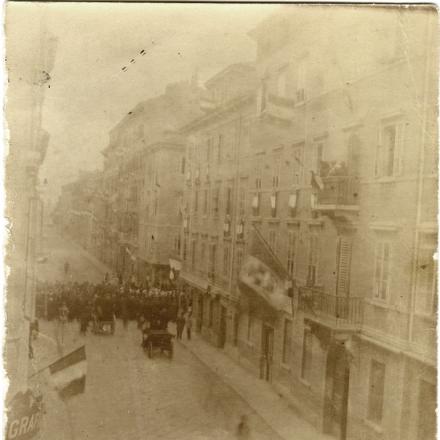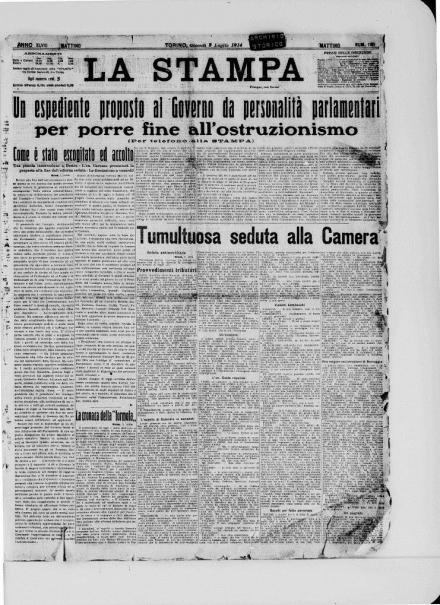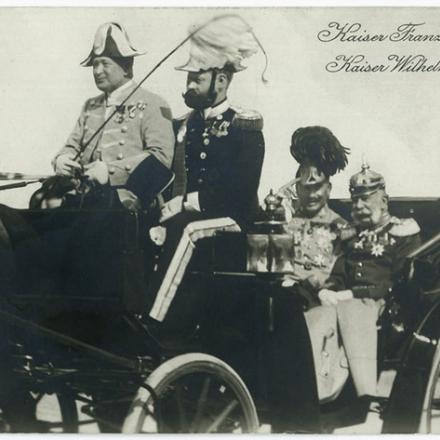Stato d’assedio esteso a tutta la Bosnia
I feretri di Francesco Ferdinando e Sophie Chotek von Chotkova sono giunti a Trieste ieri sera, accolti dalle campane a morte. Nella mattinata del 2 luglio una grande folla si è radunata per accompagnare le salme fino alla stazione; presto ripartiranno alla volta dell’Austria.
La situazione in Bosnia è meno tranquilla di quanto si creda all’estero. Lo stato d’assedio viene esteso a tutta la regione: dal boicottaggio si è passati in fretta alle sassaiole e ai saccheggi. Sembra ci siano stati due morti, ma confermare le notizie è complicato; ci si affida al sentito dire, quasi mai imparziale.
Ne nascono storie grottesche: a Zagabria, da una casa serba sarebbero partite delle bottiglie contro manifestanti croati; la gendarmeria avrebbe quindi risposto tirando sassi contro le finestre.
In tutto questo il Governo serbo ha fiutato l’aria e prova a discolparsi; condividere il pianerottolo di casa con il confinante Impero austro-ungarico non è la situazione ideale.
In ballo ci sarebbe anche l’unificazione con il Montenegro. Questo racconta il francese le Figaro.
Ma la Serbia riesce comunque a segnare un punto a suo favore, seppur in maniera indiretta: la Russia ha alzato la voce, o almeno lo hanno fatto gli organi di stampa; le discriminazioni e le violenze devono finire.
Davide Sartori
GLI AVVENIMENTI
Politica e società
- A Trieste una grande folla accompagna i feretri dell'Arciduca Francesco Ferdinando e della moglie Sophie alla stazione, da cui partiranno per l'Austria.
- Viene dato l'annuncio che il Kaiser Guglielmo II non sarà presente ai funerali dell'Arciduca.
- Il Ministro degli esteri austriaco Berchtold vuole accertarsi direttamente delle intenzioni della Germania e incontra l'Ambasciatore tedesco Tschirschky.
- L'Ambasciatore tedesco Tschirschky parla con l'Imperatore austroungarico Francesco Giuseppe e dichiara che è convinto che Guglielmo II sosterrebbe una risoluta e ben congegnata azione dell'Austria-Ungheria per quanto riguarda la Serbia.
Parole d'epoca
Francesco Giuseppe, Imperatore austro-ungarico
Lettera a Guglielmo II
Recapitata al Kaiser il 5 luglio, dall'Ambasciatore a Berlino
I sincerely regret that You should have been obliged to give up Your intention of going to Vienna for the funeral ceremonies. I should have liked personally to express to You my sincerest thanks for Your sympathy in my keen sorrow -- a sympathy which has greatly touched me.
By Your warm and sympathetic condolence You have given me renewed proof that I have in You a sincere friend worthy of confidence and that I may count upon You in every hour of grave trial.
I should have liked very much to discuss with You the general situation, but as that has not been possible, I take the liberty of sending to You the subjoined mémoire prepared by my Minister of Foreign Affairs, which was drawn up before the terrible catastrophe of Sarajevo, and which now, following that tragic event, appears particularly worthy of attention.
The attack directed against my poor nephew is the direct consequence of the agitation carried on by the Russian and Serbian Pan-Slavists whose sole aim is the weakening of the Triple Alliance and the destruction of my Empire.
By the foregoing declaration, it is no longer an affair at Sarajevo of the single bloody deed of an individual but of a well-organized conspiracy, of which the threads reach to Belgrade and if, as is probable, it be impossible to prove the complicity of the Serbian Government, nevertheless it cannot be doubted that the policies leading to the reunion of all the Southern Slavs under the Serbian flag is favorable to crimes of this character and that the continuance of this state of things constitutes a constant danger to my house and to my realm.
This danger is rendered more grave from the fact that Roumania, despite the alliance with us, has entered into friendly relations with Serbia and, on her own territory, permits against us an agitation just as venomous as that allowed by Serbia.
It is painful to me to suspect the fidelity and the good intentions of so old a friend as Charles of Roumania, but he himself has twice declared during these last months to my Minister that by reason of the aroused and hostile sentiments of his people toward us he would not be in a position in case of need to carry out his obligations of alliance.
Furthermore, the Roumanian Government encourages openly the activities of the Kulturliga, favors a rapprochement with Serbia and carries on, with Russian aid, the creation of a new Balkan alliance which can only be directed against my Empire.
Once before, at the beginning of the reign of Charles, such political fancies as these propagated by the Kulturliga disturbed the good political sense of Roumanian men of state and the danger arose of seeing Your realm launched on a policy of adventure. But at that time Your venerated grandfather in an energetic and far-sighted fashion intervened and pointed out to Roumania the road which assured to her a privileged place in Europe, and she became the strong support of the existing order.
Now the same danger threatens this kingdom; I fear that counsel alone is insufficient and that Roumania cannot be retained in the Triple Alliance unless, on the one hand, we make impossible the creation of the Balkan League under the patronage of Russia, by the entrance of Bulgaria into the Triple Alliance, and unless on the other hand, we make it clearly understood at Bucharest that the friends of Serbia cannot be our friends, and that Roumania cannot consider us as allies unless she detaches herself from Serbia and represses with all her force the agitation directed in Roumania against the existence of my Empire.
The efforts of my government should in consequence be directed toward isolation and the diminishment of Serbia. The first step in that direction will be to strengthen the present situation of the Bulgarian Government in order that the Bulgars, whose real interests coincide with ours, shall be preserved from a return to friendship with Russia.
If they realize at Bucharest that the Triple Alliance has decided not to abandon the alliance with Bulgaria, but that it is disposed to invite Bulgaria to an understanding with Roumania and to guarantee its territorial integrity, we may perhaps succeed in bringing her back from the dangerous step to which she has been led by her friendship with Serbia and her understanding with Russia.
If this should succeed, a reconciliation of Greece with Bulgaria and Turkey could be attempted. There would then arise, under the patronage of the Triple Alliance, a new Balkan alliance, the aim of which would be to put an end to the invasion of the Pan Slavist tide and to assure peace to our states.
But this will not be possible unless Serbia which is at present the pivot of Pan-Slavist policy is eliminated as a political factor in the Balkans.
And You, also after this last terrible happening in Bosnia, will see and know that one cannot think of smoothing out the differences that separate us from Serbia, and that the maintenance of peaceful policy by all the European Monarchies will be threatened as long as this focus of criminal agitation in Belgrade remains unpunished.
THE ANNEXE MEMOIRE.
(scritte un mese prima dell'attentato di Sarajevo)
Following the great disturbances of the last two years, the situation in the Balkans has cleared up to such a point that it is now possible to review the results of the crisis, and to establish in what measure the interests of the Triple Alliance, and m ore particularly those of the two Central Imperial Powers, have been affected by these events and what consequences result from them for European politics and for the Balkan policy of these Powers.
If without prejudice we compare the present state of affairs with that existing before the crisis, we must decide that the result looked at from the point of view of Austria-Hungary as well as from that of the Triple Alliance, cannot be considered in any way as favorable.
The principal point is that following the development which led to the second Balkan war, Bulgaria aroused herself from the Russian spell, and today can no longer be considered as an auxiliary of the Russian policy. The Bulgarian Government strives, on the contrary, to enter into more intimate relations with the Triple Alliance.
To these favorable elements, however, are opposed the unfavorable factors that weigh more heavily in the balance. Serbia whose policy has for years been animated by hostility toward Austria Hungary, and which is completely under Russian influence, has achieved an increase of territory and of population that exceeded by much her own expectations. Turkey, whose community of interests with the Triple Alliance was progressing well, and who constituted an important counterpoise against Russia and the Balkan States, has been almost entirely pushed out of Europe, and has seen her situation as a great power gravely compromised. Territorial proximity with Montenegro and the general strengthening of the Pan-Serbian idea have brought closer the possibility of a new expansion of Serbia by means of a union with Montenegro. Lastly in the course of the crisis, the relations of Roumania with the Triple Alliance have essentially changed.... We see, on the other hand, that Russian and French diplomacy have carried on a unified action, in conformity with a preconcerted plan to exploit the advantages obtained and to change certain factors that were from their point of view unfavorable....
The thought of freeing the Christian Balkan people from Turkish rule, in order to use them as a weapon against central Europe, has been for a long time the secret thought of Russian policy, by the traditional interest of Russia for these people. In these latter days has been developed the idea, put forward by Russia and taken up by France, of uniting the Balkan States into a Balkan alliance, in order by this means to put an end to the military superiority of the Triple Alliance. The first condition before the realization of this plan was that Turkey should be pushed back from the territory inhabited by the Christian nations of the Balkans, in order to increase the strength of these States and to render them free to expand to the west. This preliminary condition has been, on the whole, realized by the last war. On the other hand, after the end of the crisis, a division separated the Balkan States into two opposing groups of nearly equal strength: Turkey and Bulgaria on the one hand, and the two Serbian States, Greece and Roumania, on the other.
To put an end to this division in order to be able to use all the Balkan States or at least a decisive majority, to upset the balance of European power, was the latest task to which, after the end of the crisis, Russia and France applied themselves....
There is no doubt of the basis upon which, according to the intentions of French arid Russian diplomacy, these differences and rivalries might be reconciled and a new Balkan alliance created. What could be the actual aim of such an alliance in the present circumstances for the Balkan States? There is no longer reason to consider a common action against Turkey. It can, therefore, only be directed against Austria-Hungary and can only be accomplished on the basis of a program that should promise to all it members extensions of territory by a graduated displacement of their frontiers from the east to the west, at the expense of the territorial integrity of the Monarchy. A union of Balkan States upon any other basis would be impossible to imagine, but on this basis not only is it not impossible, but is in a fair way to be realized. One cannot question that Serbia under Russian pressure would consent to pay a considerable price in Macedonia for the entry of Bulgaria into an alliance directed against the Monarchy and looking forward to the acquisition of Bosnia and the adjacent territory.....
The relations of Austria-Hungary with Roumania may be at this moment characterized by the fact that the Monarchy relies entirely upon its alliance and, before as since, is ready to uphold Roumania with all its force if the casus foedoris shall arise, but that Roumania detaches itself one-sidedly from its obligations of alliance and shows to the Monarchy only the prospect of neutrality. Even the neutrality of Roumania is only guaranteed to the Monarchy by the personal affirmation of King Charles [a guaranty] which naturally is of value only for the duration of his reign and the accomplishment of which depends upon the King's keeping always the guiding hand on the direction of the foreign policy....
Under these conditions it is impossible to consider the alliance with Roumania as of sufficient certainty and extent to serve Austria-Hungary as a pivot in her Balkan policy....
To destroy, with the assistance of the Balkans, the military superiority of the two Imperial powers is the objective of Russia.
But while France seeks the weakening of the Monarchy, because that is favorable to her ideas of révanche, the designs of the empire of the Tsar have a much greater extent....
For Russia has recognized that the relation of her plans in Europe and in Asia, plans which correspond with internal necessities gravely affect the important interests of Germany, and must inevitably arouse her to resistance.
The policy of Russia is determined by an unchanging situation, and is consequently constant and foresighted. Russia's policy of encirclement directed against the Monarchy, which does not pursue a world policy, has for its final aim to make it impossible for the German Empire to resist the aims of Russia or her political and economic supremacy.
For these reasons those in charge of the foreign policy of Austria-Hungary are convinced that it is in the common interest of the Monarchy, as in that of Germany, to oppose energetically and in time in this phase of the Balkan crisis, the development foreseen and encouraged by Russia by a pre-concerted plan.
The above mémoire had just been finished when there occurred the terrible events of Sarajevo. The complete extent of this abominable assassination can hardly be realized; at all events it appears undeniable proof, if indeed any were yet lacking, of the impossibility of extinguishing the hatred between the Monarchy and Serbia, as well as the danger and the violence of the Pan-Serbian propaganda, which hesitates at nothing.
Austria-Hungary has not been lacking in good will and in the spirit of conciliation, to bring about reasonably good relations with Serbia, but it has just been shown that these efforts have been completely impotent and that the Monarchy must expect in the future to deal with the bitter, irreconcilable and aggressive enmity of Serbia.
In these conditions the Monarchy must tear away with a strong hand the net in which its enemy seeks to entangle it.
